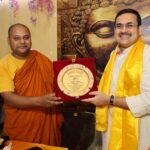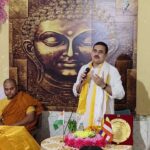OPENING ANCESTRAL TREASURE TROVE
- By : Anirban Ganguly
- Category : Articles
When one talks of Indianising education, one fundamentally argues for recovering that harvest of the past and for re-stating it authentically in the present context through a rejection of insular modernity
It is the effects of a prolonged exposure to a non-Indianised education system which sees a volume on the Makers of Modern India omit with flourish, chapters on Swami Vivekananda, Sri Aurobindo and Sarvapalli Radhakrishnan. This author without realising the debilitating and subconscious effects that a calcified and unimaginative education system has had on him, argued, that since “their (Sri Aurobindo’s, S Radhakrishnan’s) influence never really extended beyond the middle class; nor did it last much beyond their death” both these figures were now passé.
However, it is in his omission of Swami Vivekananda, that the author not only displayed a deep disconnect with the Indian psyche but also revealed the stunting effects that a deracinated education has on the shaping of one’s worldview or one’s understanding of India. Ironically, while Swami Vivekananda continues to shape and inspire the imagination of a large section of Indian youth, while his influence and touch continues to be felt in the farthest corner of the land and beyond – inspiring people to give up on accrued comfort and to take up life-long causes for welfare, humanism and amelioration of social conditions, while thinkers of the past — such as Romain Rolland and a host of others — and those of the present such as the philosopher and legendary professor of international economics Jean Pierre Lehmann, to name just one, have acknowledged their intellectual and philosophical debt to Swami Vivekananda, our public intellectual in question, has argued that Vivekananda’s influence “has passed.”
The essential issue that seeks recognition is that it is the effects of a non-Indianised education that sees young minds in India remain ignorant of Sri Aurobindo and of S Radhakrishnan and of their prodigious and profound civilisational and philosophical articulations that continue to remain relevant, but are well conversant and regurgitate with ease any second hand or superficial study of India that goes in the name of an “alternate” view.
It is ironical that while so much of the “alternate” view of India and of the Hindus float around and are submissively absorbed and parroted by a section, one hardly hears names of those who presented the actual authentic study and narrative of India and spent a lifetime articulating these. Names such as those of John Woodroffe, Stella Kramrisch, Sylvain Lévi, Louis Renou or Jean Filliozat are practically unheard of today. In fact, there has been a virtual conspiracy of silence, an academic-apartheid of sorts in the mainstream academia or the education curriculum in India against these thinkers and against introducing their thoughts. When one talks of Indianising education one essentially argues for reinstating these powerful and epochal minds and their universe at the centre of our education system and discourse.
Interestingly, the globalist and internationalist Rabindranath Tagore too was deeply disturbed by a piecemeal approach to the study and description of Indian civilisation. While asking Indians to drink deep from the fountains of the West, Tagore also often expressed his anguish at the way Indians were taught to perceive themselves. In a 1903 essay in Bengali on the history of Bharatvarsha, Tagore argued “that by not viewing Bharatvarsha from Bharatvarsha’s own perspective, since our very childhood we learn to demean her and in consequence we get demeaned ourselves.”
Discussing the biased and compartmentalised manner in which Indian history was taught, he argued in the same essay that, “Those histories make you feel that at that time Bharatavarsha did not exist at all; as though only the howling whirlwind of the Pathans and the Mughals holding aloft the banner of dry leaves had been moving round and round across the country from north to south and east to west. … However, while the lands of the aliens existed, there also existed the indigenous country. Otherwise, in the midst of all the turbulence, who gave birth to the likes of Kabir, Guru Nanak, Chaitanya, and Tukaram? It was not that only Delhi and Agra existed then, there were also Kasi and Navadvipa. The current of life that was flowing then in the real Bharatavarsha, the ripples of efforts rising there and the social changes that were taking place — none of these find an account in our history textbooks.”
When one talks of Indianising education one essentially argues for rediscovering and reconnecting with that “current of life” which flowed in Bharatvarsha, with that “indigenous country” and its many achievements and for including them in “our history textbooks” and accounts. The thought of evolving a balanced and authentic narrative of India seemed to have pursued Tagore even later. In 1919, while delivering his talk on the “Centre of Indian Culture”, in Madras, at the invitation of Annie Besant, perhaps the first talk he delivered in English, the poet was even more direct, cautioning against the tendency of becoming “insularly modern.” “There are some”, pointed out Tagore, “who are insularly modern, who believe that the past is the bankrupt time, leaving no assets for us, but only a legacy of debts. They refuse to believe that the Army that is marching forward can be fed from the rear. It is well to remind them that the great ages of renaissance in history were those when men suddenly discovered the seeds of thoughts in the granary of the past. The unfortunate people, who have lost the harvest of their past, have lost their present age.”
The poet exhorted his young audience to take help of the “treasure trove of our ancestors” and make their future their own and “never continue our existence as the eternal rag-picker at other people’s dustbins.” When one talks of Indianising education, one fundamentally argues for recovering that “harvest of the past” and for re-stating it authentically in the present context through a rejection of insular modernity.
In her essay, Place of Foreign Culture in a true Education, Sister Nivedita, for example, put forth a crucial argument in her characteristic style when she said, “it would be a sin to bring up an Indian child on anything but the Mahabharata (including the entire gamut of Indian scriptures, epics, kathas). But if he could not, when educated, appreciate the poetry of Homer, that fact would mean a limitation of his culture. A thorough training in our own ideals is the only preparation for an enjoyment of all. We learn our own, in order to enjoy all…But we must not seek to reverse the process. We must not seek through Alfred Tennyson to produce the love of Ramayana. Such shilly-shallying can induce only an imitative and bastard culture.” When one speaks of Indianising education one intrinsically aspires to encourage a “training in our own ideals” first, or as Aurobindo indicated in his essays on national education, a training from the near to the far.
The Indianisation of education also seeks to evolve and create true teachers of Indian traditions and of India, as Ananda Coomaraswamy noted once, “none can be true educators of the Indian people who do not inherit their traditions, or cannot easily work in a spirit of perfect reverence for those traditions. Others can be, not educators, but merely teachers of particular subjects.” The debate on the Indianisation of education is a welcome breeze; it offers an opportunity, long denied, for reassessing our civilisational self.

















